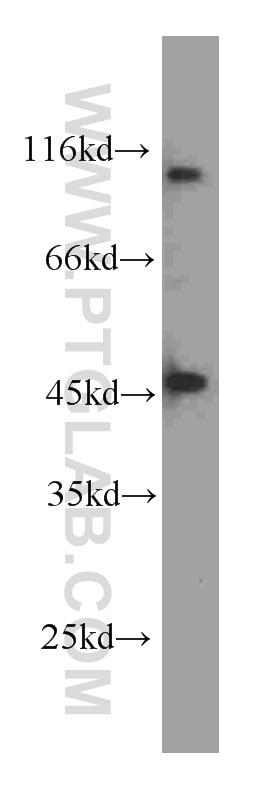Tested Applications
| Positive WB detected in | Hela cell |
Recommended dilution
| Application | Dilution |
|---|---|
| Western Blot (WB) | WB : 1:1000-1:4000 |
| It is recommended that this reagent should be titrated in each testing system to obtain optimal results. | |
| Sample-dependent, Check data in validation data gallery. | |
Product Information
60235-1-Ig targets TTF1-Specific in WB, ELISA applications and shows reactivity with human, mouse samples.
| Tested Reactivity | human, mouse |
| Host / Isotype | Mouse / IgG2a |
| Class | Monoclonal |
| Type | Antibody |
| Immunogen |
Peptide Predict reactive species |
| Full Name | transcription termination factor, RNA polymerase I |
| Calculated Molecular Weight | 103 kDa |
| Observed Molecular Weight | 106 kDa |
| GenBank Accession Number | NM_007344 |
| Gene Symbol | TTF1 |
| Gene ID (NCBI) | 7270 |
| RRID | AB_2881359 |
| Conjugate | Unconjugated |
| Form | Liquid |
| Purification Method | Protein A purification |
| UNIPROT ID | Q15361 |
| Storage Buffer | PBS with 0.02% sodium azide and 50% glycerol, pH 7.3. |
| Storage Conditions | Store at -20°C. Stable for one year after shipment. Aliquoting is unnecessary for -20oC storage. 20ul sizes contain 0.1% BSA. |
Background Information
TTF1 is a multifunctional nucleolar protein that terminates ribosomal gene transcription, mediates replication fork arrest and regulates RNA polymerase I transcription on chromatin. It plays a dual role in rDNA regulation, being involved in both activation and silencing of rDNA transcription. Interaction with BAZ2A/TIP5, TTF1 recovers DNA-binding activity. The antibody is specific to TTF1.
Protocols
| Product Specific Protocols | |
|---|---|
| WB protocol for TTF1-Specific antibody 60235-1-Ig | Download protocol |
| Standard Protocols | |
|---|---|
| Click here to view our Standard Protocols |




